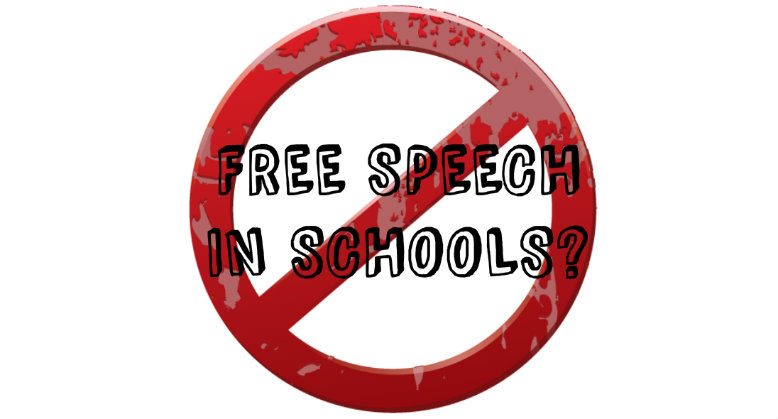
A Middletown High School South social studies teacher, Jospeh Ventre, was reportedly pressured to resign after the administration received “at least” one complaint because Ventre played a viral Last Week Tonight segment about Donald Trump in class.
The video at the center of the controversy is a 20-minute take down of the presidential candidate, where host John Oliver mocks Trump and pushes viewers to use his old family name, “Drumpf,” to separate the mogul-turned-politician from his real estate brand. Some argued that the video was inappropriate in a classroom setting, and was a violation of Ventre’s contract against indoctrinating students to personal political beliefs, since he did not show videos about the other presidential candidates.
So where is the line drawn in protecting free speech of public employees?
In a 1968 U.S. Supreme Court case, Pickering v. Board of Education, it was declared that teachers have the constitutionally protected right to speak publicly on issues of public concern. The following year, the Tinker v. Des Moines Independent School District ruling declared “students nor teachers shed their constitutional rights to freedom of speech or expression at the schoolhouse door.”
However, there is an ambiguous gray area of where and when these rights to free speech are upheld.
For example, in an informative piece titled “Do You Have the Right to be an Advocate?” published on EdWeek.org, Julie Underwood, a professor of law and educational leadership and policy analysis at the School of Education, University of Wisconsin-Madison, explains the “district or the state can regulate employee speech during school hours or at school-sponsored activities to protect their own interests in instruction and political neutrality.” Therefore, the protection of free speech for public teachers is extremely subjective. However, Underwood concludes that despite the ambiguity in the laws protecting a teacher’s freedom of speech:
“Public educators are in the best position to influence public policy about public education. Ignoring that opportunity is a mistake. Educators offer a professional view on the effect of proposed policies. Beware of and respect the parameters that you should work within but don’t allow those boundaries to censor you into silence. Every educator can both honor the law and make their views known to local school boards and state and national elected officials. The country and its children need to hear your voices in these important debates.”
In a request for comment on Mr. Ventre’s situation, Underwood said, “It is not right for a K-12 teacher to use their position in the classroom to indoctrinate their students with their own political view. But there are many situations when using difficult, political, and even controversial subjects within a classroom is a great learning experience.” So in what context was the video shown to the class? “If it relates to the in class instruction and is age appropriate there is a good rationale for having a political discussion,” Underwood concludes.
It’s difficult to say what really happened in the classroom that day (we have reached out to Ventre and the administration for comment).
If the lesson plan did not involve the current presidential primary or the history of American elections, then showing the video in class could potentially be interpreted as pushing a personal political agenda.
Or, let’s say the lesson plan was about the current primary: the crux of the issue and what makes this a potential case of “indoctrination” is that the teacher did not show videos about the other presidential candidates. Therefore, the version of current events the teacher presented to the class is skewed.
David Hudson, Jr., a First Amendment expert, law professor who serves as First Amendment Ombudsman for the Newseum Institute’s First Amendment Center, and author of several books including Let The Students Speak: A History of the Fight for Free Expression in American Schools, thinks Mr. Ventre should have leeway as a social studies teacher in how he conducts his lessons. “As long as they are teaching something germane to the subject matter, they ought to have significant freedom in how they do it, particularly in a government or social studies class,” Hudson says.
In this case, it depends on how strictly the Third Circuit (the court of appeals with jurisdiction over Pennsylvania, New Jersey and Delaware) interprets the U.S. Supreme Court decision in Garcetti v. Ceballos (2006).
“In 2006, the U.S. Supreme Court dramatically reduced the level of public employees’ free speech, including public school teachers,” explains Hudson. “It essentially said that when teachers make statements pursuant to their official job duty, they have no first amendment protection. Some have interpreted that to essentially mean classroom speech. So if you interpreted [the Garcetti ruling] extremely broadly, any classroom speech by a teacher is official job duty speech, and as such is not entitled to first amendment protection.”
“I disagree with that ruling. I think that depending on the context, again, as Ms. Underwood said, it can be great education to expose students to different political views… I think that exposing students to leading political candidates is important pedagogically, and that teachers should have academic freedom, which is often an ignored concept in the K-12 environment,” says Hudson.
Mr. Ventre has since rescinded his resignation letter, as a petition circulates with nearly 3,000 signatures to save his job.
Watch the video in question below, and let us know what you think in the comments.
*This story has been updated to include quotes from First Amendment expert David Hudson, Jr.

The video in question says fu¢king three times, fu¢k off once, fat as$ once, finger free @nus once, not a single thing worth m@sturb@ting to once, bu!!sh!t once and sh!ttҰ once. Are these the values that a public school teacher should bring into the classroom and show to 15 year olds? We can’t say a prayer in school, but he can bring this potty mouth in?